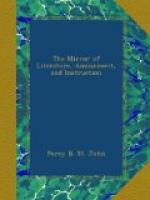Turn over the pages of the Old Bailey session papers for years past, and you cannot but be struck with the anomalies which are there apparent, with respect to crimes and the sentences which have followed. The impression a perusal of these papers made on my mind, was as if all the business had been done by lottery; and my observation during twenty-two sessions on the occurring cases has tended to convince me, that a distribution of justice from that wheel of chance could not present a more incongruous and confused record of convictions and punishments. In no case (always excepting the capitals) can any person, however acute and experienced, form the slightest opinion of what the judgment of the court will be. Of this the London thieves are fully aware. I never could succeed in persuading one before his trial, that he was deprived of all chance of escape. They will answer, “Look what a court it is! how many worse than me do scramble through; and who knows but I may be lucky.” What men know they must endure, they fear; what they think they can escape, they despise: their calculation of three-fourths escaping is very near the truth. Hope, the spring of action, induces each to say to himself, “Why may I not be the lucky one?” THE CHANCE THUS GIVEN OF ACQUITTAL IS THE MAIN CAUSE OF CRIME. I do not mean to say three-fourths come off free; they are subjected to some kind of punishment (excepting a few cases of judgment respited); the others feel, no doubt, what they undergo, but it is only as a soldier in the fight considers a scratch—otherwise coming off with a whole skin, being ready for action again. Another evil arises out of this irregularity of judgments. All punishments are rendered severe




